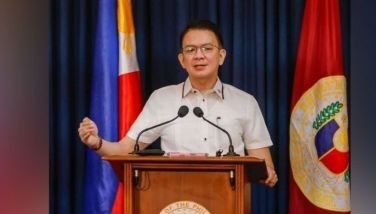Beyond the bluff
Every second semester of the academic year, my former alma mater, UP High School Cebu, assigns me a four-unit teaching load for the subject Media and Information Literacy for senior high school students. As in previous years since I started teaching this subject, our class will discuss the “The Social Dilemma”, a docu-drama on Netflix that explores the dangerous human impact of social networking. The film earned seven Emmy nominations and won two, including Best Writing.
I urge everyone to watch documentaries like this and read articles on the dangers of misinformation and disinformation in society. I have often written about the dangers of disinformation in this space. If there is anything new I can share on the topic these days, it is my gut feeling that the days of disinformation are numbered.
Well, it may be more than just a gut feeling because I have reasons for my confidence. One is that media literacy, as I mentioned earlier, is now being taught in schools --at least at the senior high level. We are gradually educating media-literate youth who are less susceptible to disinformation. As more people become capable of recognizing disinformation, its effectiveness as a tool of manipulation declines.
Second, lawmakers and regulators are now considering laws and policies to curb disinformation. A recent House tri-committee hearing on fake news is one example. Another is the SIM Card Registration Act, which aims to reduce anonymity in online trolling and misinformation. While I oppose laws that criminalize fake news --since they can be weaponized by state elements to target professional journalists-- I support policies that incentivize credible information and discourage misinformation. The proliferation of trolls and fake news on social media is significantly driven by a system that rewards online pages and sites based on engagement and views, without regard for content quality. That must change.
Third, misinformation and disinformation ultimately harm business models, prompting independent media companies like Facebook and X to develop better policies to curb their spread --or so I hope. I use the term 'independent' because some companies, like TikTok, are accused of being state-backed and used as tools in geopolitical information warfare.
The fourth and most important reason I believe disinformation, as we know it today, is in decline is due to 'disinformation fatigue' among the public. Social media has been with us for over two decades. Eventually, people will grow weary of fake news, hopefully leading to a stronger preference for verified sources.
The introduction of new media and technology always brings immense challenges, and for our era, that challenge is disinformation. When newspapers emerged centuries ago, it was followed by the rise of “yellow journalism”, characterized by sensationalist and unethical reporting. This problem eventually declined as journalism ethics and professional standards developed in the 20th century.
In the Philippines, trolls and their backers may have begun to realize their declining influence among the public. Trolls have recently spread threats and fake news against House legislators who supported the fourth impeachment complaint against Vice President Sara Duterte Carpio. The legislators promptly called their bluff.
Despite the bluff and deimatic posturing of these pro-Duterte trolls and ‘influencers’, who try to appear more powerful through aggressive or exaggerated displays of online rhetoric, their influence is waning. This is evident in the continued decline of Vice President Sara Duterte’s trust and popularity ratings, as well as the poor performance of the other Dutertes in national polling for a hypothetical Senate run.
Thus, whoever is behind these disinformation campaigns --which, interestingly, always favor the pro-China power block in the country-- I would not be surprised that with the declining yet still menacing influence of trolls, they are now refining their targeting to the most consequential sectors.
Call it gut rhetoric, but I believe that any geopolitical power seeking to help install a regime that would align with its interests would target the military and police in its disinformation campaign. This sector is crucial in tipping any precarious balance of forces that could emerge from recent political events, no matter how remote the possibility.
This week, while waiting for my case to be called outside the courtroom, I observed a policeman intently watching a pro-Duterte YouTube page, which I could overhear spreading fake news and lies. The gentleman seemed convinced by what was being shared. I hope the defense and law enforcement establishments remain vigilant and ensure that their personnel are protected from the influence of disinformation.
- Latest
























